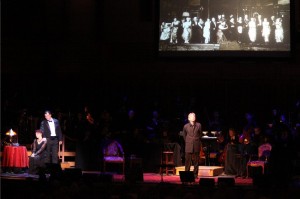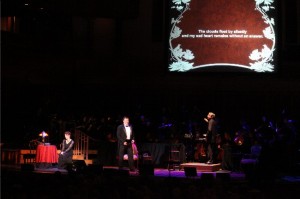Culture Vulture: A Unique Blend of Jewish Memoir and Musicology
THE THOMASHEVSKYS: MUSIC AND MEMORIES OF A LIFE IN THE YIDDISH THEATER. Written and hosted by Michael Tilson Thomas. Directed by Patricia Birch, with members of the Boston Symphony Orchestra at Tanglewood.

MIchael Tilson Thomas hosts his musical memoir about his grandparents, The Thomashevskys, at Tanglewood
I’m a fan of the serious introspective kind of memoir, that tries to wrest meaning from existential and emotional chaos. But I’m also drawn to those memory projects that document people and events that have disappeared or been disappeared from history. This second type of memoir is usually a labor of love, demanding years of exhaustive research in archives, personal interviews and over the internet.
Because such excavation leads the explorer in many different directions and often turns up diverse wonderful documents – genealogical and business records, maps, family letters, diaries and photographs, to name just a few artifacts — some memoirists choose to construct websites rather than go through the lengthy process of writing and publishing a narrative.
Memoir has extended the concept of such memory narratives across all the arts these days: weaving the narrator’s personal memories and research memory into music, theater, dance, painting, photography, and performance. The deft and polished Thomashefsky Project, now in its 10th year of development, mixes all of it up into a true multi-media memoir.
The Project belongs to Michael Tilson Thomas, veteran conductor and now Music Director of the San Francisco Symphony. Although Tilson Thomas grew up playing classical music and worked closely with such giants of that world as Heifitz, Piatigorsky, Stravinsky and Boulez – to name but a few – the Yiddish theater world of his grandparents Boris and Bessie always loomed large. Their story is, in fact, the stuff of family myth: as mere teenagers, the two of them came out of what the conductor calls “Nowhere, Ukraine” to become stars of the American Yiddish Theater.
Boris (1868-1939) fled Russia at age 12, crossed the Atlantic in steerage, and became a child soprano at the Henry St. Shul in New York at 14. He saw Yiddish theater for the first time in New York City when a friend took him, fell in love with it and decided that he could do it too.
Although Roumanian actor and playwright Abraham Goldfaden – who is generally credited with establishing the first Yiddish Theater — took his company to Russia, Boris had never seen those productions. Czar Alexander II’s assassination in 1881 and the pogroms that ensued prompted a huge emigration of Jews – including Yiddish actors – to western Europe and the United States. All Yiddish Theater was banned in Russian in 1883, with the result that it migrated west with its audience.
At 16, according to Tilson Thomas, his grandfather was gifted and driven enough to have become a leading man, touring up and down the Northeast corridor from Boston to Washington, D.C. In Baltimore, a 14-year-old girl named Bessie saw the show, fell in love with the star, and a year later moved in with him.
Boris died before his American grandson was born in 1944, and did not tell him his version of events. But Bessie lived until 1962 – “lived the lobby life of a Hollywood hotel,” according to her grandson, with “flame-red hair into her 80s, cigarette-holder, big sun glasses, and huge stack of Yiddish newspapers.”
When she came to her son’s home in the San Fernando Valley, she’d take Michael aside and say, “Your parents are nice conventional people. But you — you’re like me!” She told him stories of her glory days, sang the songs she had once sung onstage, gave him the tails she wore in her trademark trouser roles and sighed, “You don’t know who I am.” As a teenager, Michael found his grandmother fascinating but was neither interested in the music nor in the Yiddish language. Both she and Boris left behind long memoirs of their experiences in Yiddish, along with boxes of photographs, theater posters, scripts, scores, costumes and newspaper clippings that sat untouched for half a century.

A scene from The Thomashevskys at Tanglewood
Michael Tilson Thomas says nothing about his parents’ relationship to his flamboyant grandparents but one infers that they distanced themselves from the Yiddish world. Theodore Herzl Thomashefsky, Michael’s father, changed his name to Ted Thomas, married a schoolteacher and moved from New York to California.
The conductor doesn’t say what, exactly, prompted him to dig into the enormous number of family documents but the Thomashefsky Project began in 1998 as an attempt to document the family stories with dates, facts and context. The research team uncovered more than 1000 items including not one but three untranslated memoirs by Bessie and a clip from the 1935 film “Bar Mitzvah” a clip of which was shown, was found, restored and is owned by The National Center for Jewish Film. After performances in New York, Los Angeles and San Francisco beginning in 2005, the material has been streamlined to run two and a half hours.
Although the stage of Seiji Ozawa Hall was meant to suggest a cabaret, the 35-piece orchestra, the four miked actor-singers, the screen on which posters, photographs, film clips, and English subtitles were projected made the audience feel as though they were part of a giant wedding. “Ladies and Gentlemen, welcome,” the conductor greeted the audience from the middle of the stage, and urged them to clap along with the circus-like overture to Joseph Rumshinsky’s Khantshe in amerike.
“That was the March of the Jewish suffragettes,” he explained and “the greatest success of the 1915 season as played by Madame Bessie Thomashefsky.” Then he launched into a unique blend of memoir and musicology.
The Thomashefsky Project aims to “educate, elevate and entertain.” It also recreates in far more polished form than the original a disparaged, poor people’s theater, its characters, its language and especially its music. In the growing Yiddish-speaking Northeast corridor of the U.S, in the 1890s and 1900s the Thomashefskys and their work were considered “shund ” – trashy, schmaltzy, and low-brow – compared to the more intellectual Jacob Adler, who produced serious translations of plays by Shakespeare, Ibsen and Shaw and whose daughter Stella Adler, became the doyenne of American acting. When Jacob Adler announced that he would be doing a Yiddish King Lear,Boris responded with a Hamlet “translated and improved” by Thomashefsky.
Shund or not, I found Michael Tilson Thomas’s fast-paced resurrection of Goldfaden and Rumshinsky’s century-old songs and skits great fun. Michael Tilson Thomas made for a relaxed, engaging narrator and his four performers, Judy Blazer, Neal Benari, Ronit Widmann-Levy and Eugene Brancoveanu were uniformly excellent. The BSO players made the most of the simple, often predictable music.
Although the multi-media blitz of acting, graphics, sound and narration were too much for an Old Media type like myself to take in all at once, the Thomashefsky Project made for an evening where everyone left smiling.
Helen Epstein is the author of memoirs “Children of the Holocaust” and “Where She Came From.”
